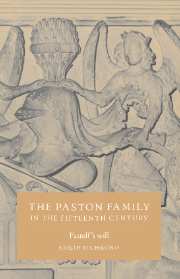1 - The characters re-invented
Published online by Cambridge University Press: 24 December 2009
Summary
Simon Payling has told us: ‘What we do not know may be more important than what we do.’ Historians are in bondage to knowledge; what we do not have evidence of may not be written about: it is simpler being a novelist. Take Judge William Paston. He conforms to a type. As Simon Payling, among others, has shown, judges marry locally and modestly. ‘But’, he goes on, ‘although judges themselves only infrequently married heiresses [Judge William did, but Agnes Berry was modest and local], the advance in social status that their careers brought to their families often enabled their descendants to marry with advantage, and it was marriage rather than continued service in the law that enabled the social advance of the family to continue.’ Judges were hugely over-paid; this enabled them to purchase hugely in the (local) land market. One thing William did not have to do was change his name. The Nottinghamshire Bugges became the Binghams in the senior line: they purchased and then resided at the manor of Bingham; however, Richard Bugge, a younger son, got another purchased estate and became Richard Willoughby; it was his son, another Richard, the famously corrupt judge, who made the Willoughbys ‘comfortably the wealthiest non-baronial family with lands in the county’. Judge William did the opposite, as it were. Rather than change his name, say to Oxnead or Gresham, he created a manor and called it after himself, and was scornful of the Winters who had only yesterday been Hailstones.
- Type
- Chapter
- Information
- The Paston Family in the Fifteenth Century , pp. 7 - 52Publisher: Cambridge University PressPrint publication year: 1996



